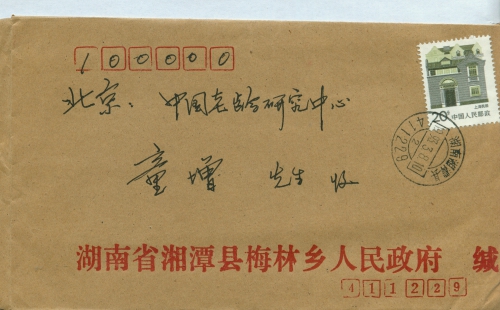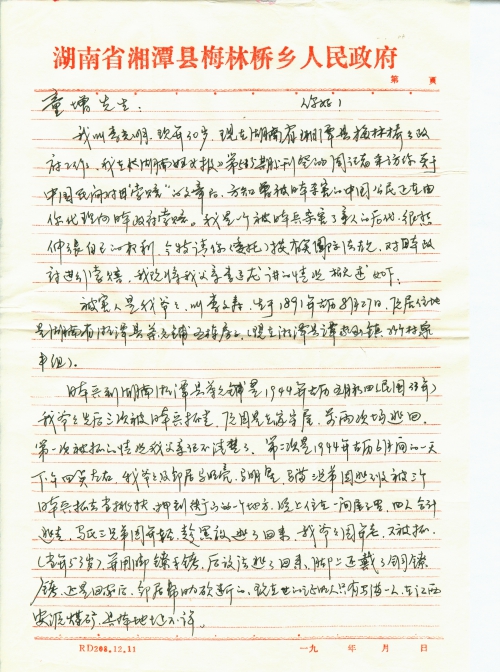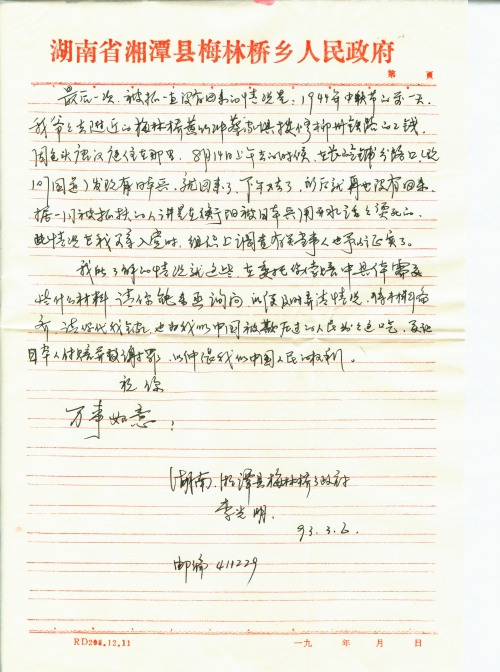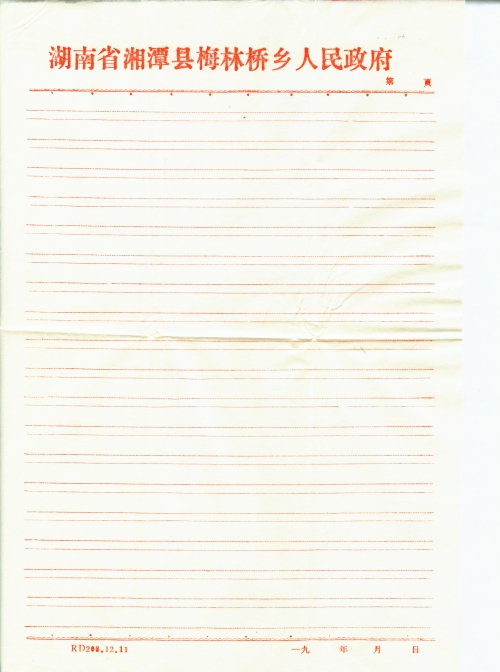Date of letter:1993-03-02
Address of author:Xiangtan County, Xiangtan City, Hunan Province
Date of event:1944
Location of event:Xiangtan County, Xiangtan City, Hunan Province
Name of author:Li Guangming
Name(s) of victim(s):Li Wenshou(Li Guangming’s grandfather)
Type of atrocity:Slave Laborers, Murders(SL, MU)
Other details:My name is Li Guangming. During 1944, my grandfather Li Wenshou was captured by Japanese for three times to work as a porter. He once managed to run home with shackles on feet. However, he failed to make it for the last time. According to a fellow witness, he was burnt to death by Japanese with boiled water.
Mr. Tong Zeng:
How have you been?
I am Li Guangming, 30 years old and works with the Government of Meilinqiao, Xiangtan, Hu’nan. After reading an article about reporter Zhou’s interview with you about Chinese civilians’ claim for compensation against Japan from the Hu’nan Women’s News Issue 515, I know that you are forging a drive for compensation against the Japanese government on behalf of Chinese citizens killed by the invading Japanese army. I am an offspring of a victim killed by Japanese soldiers and want to pursue justice. I sincerely ask (entrust) you to claim for compensation against the Japanese government in accordance with relevant international regulations. The facts told to me by my father Li Yunlong are described below:
The victim is my grandfather Li Wenshou. He was born on lunar August 27, 1891 and lived in Wudongfangzi, Chayuanpu, Xiangtan, Hu’nan (now Quanfeng, Zizhu, Tanjiashan, Xiangze).
The Japanese soldiers invaded Chayuanpu on lunar May 4, 1944 (the 33rd year of the National Republic of China). My grandfather was arrested by Japanese soldiers on three different occasions because he stayed at home to look after the house. He escaped and returned twice. My father cannot remember clearly when my grandfather was arrested the first time. The second time was about 4 p.m. of one day in lunar June of 1944. My grandfather and neighbors Ma Mingliang, Ma Mingxing and Ma Man (three brothers) were unable to escape and were captured by Japanese soldiers to become forced laborers. They were sent to a place at Hengshi and kept in a room at night. Four of them planned an escape. The three brothers were young and escaped in the dark of night. But my grandfather was older (then 53 years old), he was arrested again and this time he was shackled. He managed to escape back to our home with shackles on his feet, which were cut off with the help of neighbors. The only living witness is Ma Man, who works in a mine in Anyuan, Jiangxi. The specific address is unknown.
Then, my grandfather got arrested the last time and he never came back. On the previous day of the mid-autumn festival in 1944, my grandfather went to the near-by Caijiaba, Huangzhuchong, Meilinqiao to demand the payment of wages for building the Liuzhou railway. The foreman Tang Hanting lived there. On the morning of August 14, he found some Japanese soldiers at the intersection of Changlingpu (now the 107 National Highway), so he came back. He went again in the afternoon and never returned. According to another person who was also arrested, my grandfather was boiled to death by Japanese soldiers with hot boiling water in Hengyang. This incident was verified by authorities when my father applied to joining the Party.
That’s all I know. If any materials are needed to entrust you with the claim, please tell me in a reply letter so that I can promptly provide the materials. Please pursue justice for my family and other Chinese people oppressed by the invading Japanese army. We demand apologies and compensation against the Japanese government.
Wish you all the best.
Government of Meilinqiao, Xiangtan, Hu’nan
Li Guangming
March 6, 1993

















